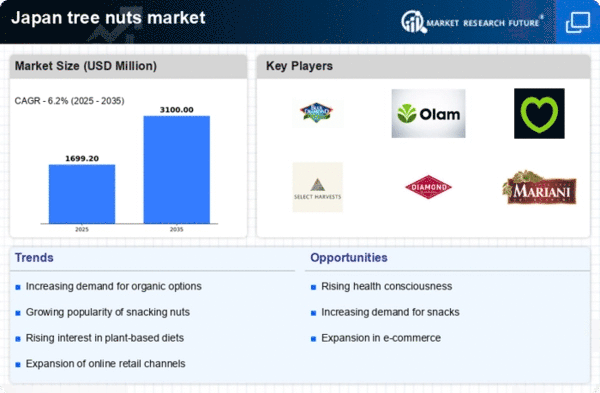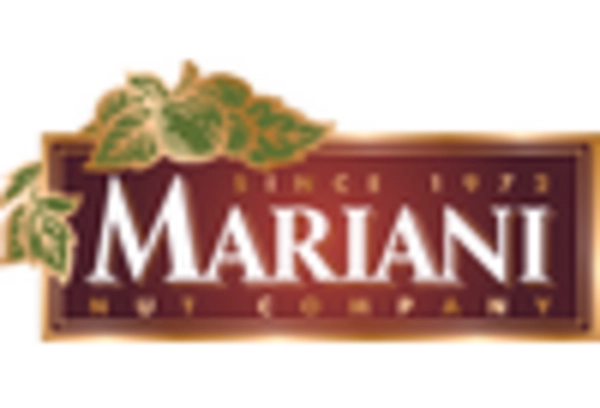Rising Demand for Healthy Snacks
The tree nuts market in Japan experiences a notable increase in demand for healthy snacks, driven by a growing awareness of nutrition among consumers. As health consciousness rises, tree nuts are perceived as a nutritious option, rich in essential fatty acids, proteins, and vitamins. In 2025, the market for tree nuts is projected to reach approximately $1.5 billion, reflecting a compound annual growth rate (CAGR) of around 5%. This trend is particularly evident among younger demographics, who are increasingly seeking convenient yet healthy snack alternatives. The tree nuts market is thus adapting to these preferences by introducing innovative products that cater to health-oriented consumers, such as organic and flavored varieties.
Sustainability and Ethical Sourcing
Sustainability has become a pivotal concern for consumers in Japan, influencing their purchasing decisions in the tree nuts market. There is a growing preference for products that are ethically sourced and environmentally friendly. The tree nuts market is responding by emphasizing sustainable farming practices and transparent supply chains. This shift is likely to attract environmentally conscious consumers, potentially increasing market share. In 2025, it is anticipated that sustainably sourced tree nuts could account for up to 30% of total sales, reflecting a significant shift in consumer behavior. This trend not only supports environmental goals but also enhances brand loyalty among consumers who prioritize sustainability.
Increased Use in Culinary Applications
The culinary landscape in Japan is evolving, with tree nuts gaining popularity as versatile ingredients in various dishes. Chefs and home cooks alike are incorporating tree nuts into traditional recipes, enhancing flavors and textures. This trend is supported by the tree nuts market, which promotes the use of nuts in both savory and sweet dishes. The incorporation of tree nuts into Japanese cuisine not only adds nutritional value but also aligns with the growing trend of fusion cooking. As a result, the market for tree nuts is expected to expand, with an estimated growth rate of 4% annually. This culinary integration reflects a broader acceptance and appreciation of tree nuts within Japanese gastronomy.
Growing Popularity of Plant-Based Diets
The shift towards plant-based diets in Japan is significantly impacting the tree nuts market. As more consumers adopt vegetarian and vegan lifestyles, tree nuts are recognized as a vital source of protein and healthy fats. This trend is likely to bolster the market, with projections indicating a growth rate of 5% annually in the segment catering to plant-based consumers. The tree nuts market is responding by diversifying product offerings, including nut-based spreads and dairy alternatives. This alignment with dietary trends not only meets consumer demand but also positions tree nuts as a staple in the evolving food landscape.
Innovations in Packaging and Preservation
The tree nuts market in Japan is witnessing innovations in packaging and preservation techniques, aimed at enhancing product shelf life and convenience. Advanced packaging solutions, such as vacuum sealing and resealable bags, are becoming increasingly popular. These innovations not only preserve the freshness of tree nuts but also cater to the on-the-go lifestyle of modern consumers. The tree nuts market is likely to see a rise in sales as a result of these advancements, with an expected increase of 6% in packaged nut products by 2026. This focus on packaging aligns with consumer preferences for convenience and quality, further driving market growth.
















